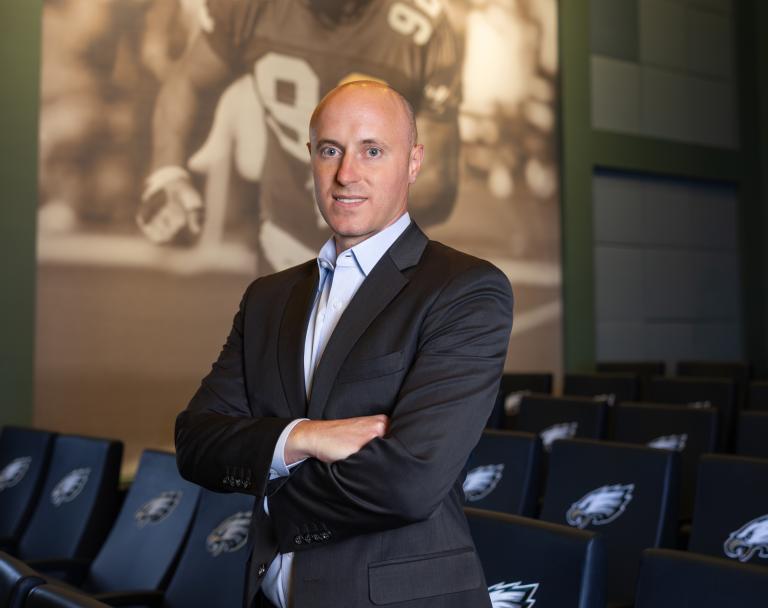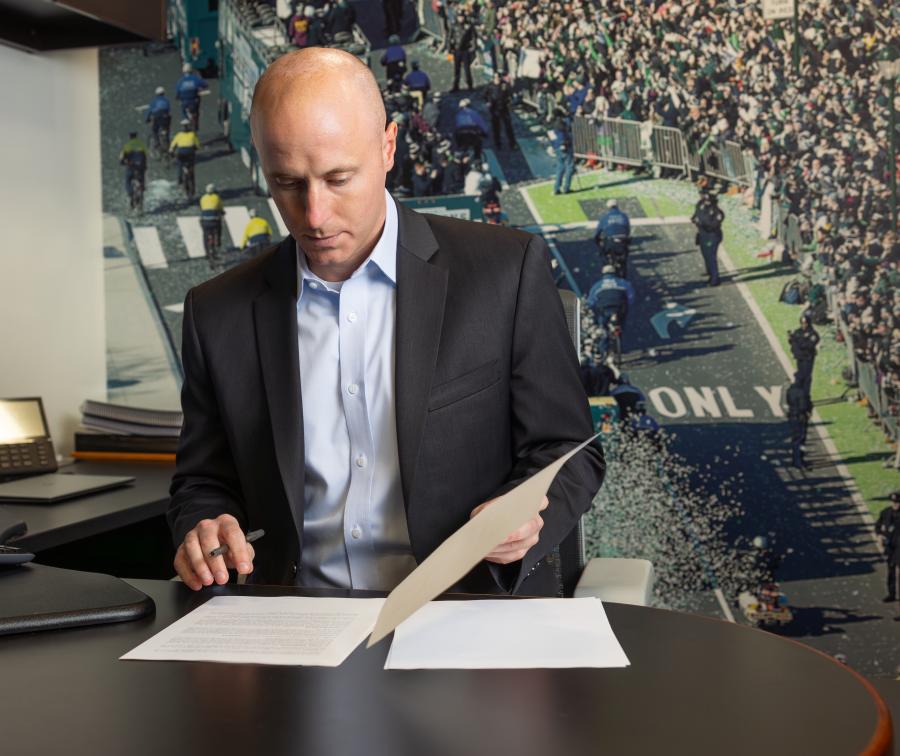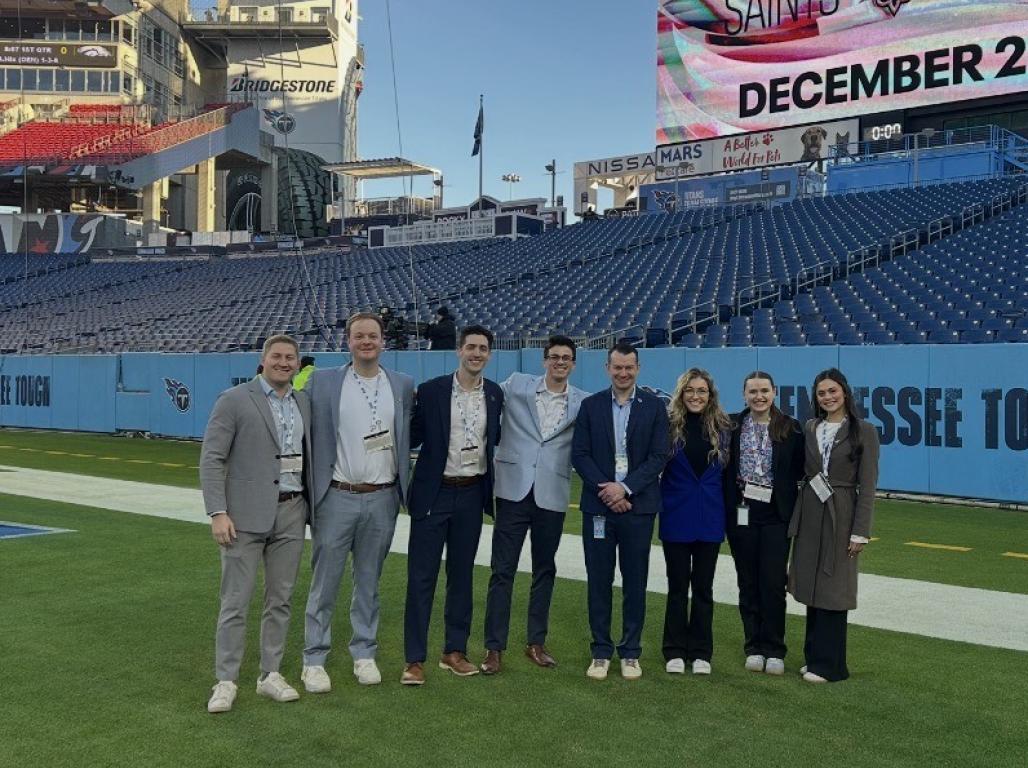
From York College of Pennsylvania classrooms to the Philadelphia team’s front office, the 2011 Sport Management alumnus has built a career on strategy, persistence, and innovation.
When the confetti floated down at the 2025 Super Bowl and the Philadelphia Eagles hoisted the Lombardi Trophy for the second time in franchise history, Senior Vice President of Football Administration Bryce Johnston knew just how rare the moment was.
“The longer you’re in the league, the more appreciation you have for how difficult it is to win the Super Bowl,” says Johnston ’11, who majored in Sport Management at York College of Pennsylvania. “There are a lot of decisions that contribute over a long period of time. There’s a tremendous communal aspect to it in terms of the city and fan base, and that amplifies the emotions to it.”
An early start in NFL analytics
Johnston’s path to success in the NFL began even before he came to York College, where he played Division III lacrosse while pursuing his degree. As early as middle school, he was intrigued by the idea that analytics and data could be used to build a better professional sports team.
He often heard about players opting for free agency because of restrictions posed by the salary cap, the maximum total that any NFL team can spend on player salaries. He researched everything he could find on the topic, compiled the information in spreadsheets focused on the Philadelphia Eagles’ salary cap, and then shared his data online.
This was around the time that the book Moneyball: The Art of Winning an Unfair Game came out, delving into statistics that amateur baseball enthusiasts had collected over the years. Number crunching and data analytics were becoming hot topics in professional sports. Johnston was invited to speak on the radio as a teen expert on the salary cap.
When it came time to select a college, he had a short list of criteria. He wanted to play Division III lacrosse at a school in the mid-Atlantic region with a Sport Management program. York College checked all the boxes.
“I had this vision for the type of career path I wanted to go on,” Johnston says. “The affordability and location all fit.”
By the time he stepped onto the York College campus, Johnston possessed years worth of practical knowledge about how teams manage their rosters and finances. He continued operating his Eagles salary cap website throughout his years at the College.
A foundation formed at York College
Johnston’s York College classes emphasized real-world preparation, which was exactly what he sought.
“The professors approached the classes more like workplace bosses than academic scenarios. There was more of a focus on practically how do you address the problem presented and how do you work together with people to figure out what your boss is looking for,” he says.
That style of teaching helped him transition seamlessly into professional environments once he began his career. In addition, Johnston seized opportunities outside the classroom. He traveled to international conferences in Greece and Hawaii, giving him early exposure to thought leaders in sport management.
Law, analytics, and the NFL
While Johnston valued the educational foundation that York College provided, he began to realize that many people breaking into sport management held advanced degrees. He knew he’d need a second degree to be on par with those getting the jobs he wanted.
After graduating from York College, he attended Georgetown University Law Center, then began his career as a corporate attorney in New York City. Even while working in law, Johnston continued to pursue his passion. His salary cap analysis website evolved, broadening into strategy and analysis for the entire NFL.
That platform, and the expertise behind it, helped him pivot to working for the Eagles. Today, his responsibilities are wide-ranging.
“I work on everything related to player contracts, salary cap strategy, compliance, bargaining agreements,” Johnston says. “I work closely with our scouts, medical team, in between football operations and legal and accounting, pretty much everything except evaluating film and players.”
Two victories at the Super Bowl
For Johnston, the Eagles’ championships in 2018 and 2025 stand out as highlights of his career, but each has its own meaning to him. The first Super Bowl win occurred in only his second season with the team, so many of the decisions that led to that title had been put into place before he arrived.

With the 2025 victory, Johnston had been involved in the decision-making process, including major coaching and roster turnovers. Through rigorous analysis and strategic planning, reworking how the team wrote player contracts and thinking outside the box with salary caps and bargaining agreements, Johnston, using decades of experience in sports analytics and contract law, had a much bigger hand in building the team that would rise above 31 others.
“We’ve had a lot of situations where part of the contract is wonky in the salary cap space. If you’re paying attention, it makes a difference over time,” he says. “We’re operating within a salary cap, but we’re working all the time to push the boundaries of what’s possible.”
While Johnston has experienced the Super Bowl in person twice, most recently perched in an executive box with the Eagles’ top leadership, some of his most memorable career moments come from the grind behind the scenes.
“When you’re in the middle of free agency or the middle of the draft or the planning that goes into that, there are outcomes that could go either way,” he says. “You know all the different branches that could play out. The most memorable parts are ideas that came to fruition and made an impact and have fortuitous outcomes.”
Empowering innovation
Johnston credits much of the Eagles’ success to a culture that embraces creativity and empowers people at every level of the organization.
The closer he works with the Eagles’ top leadership, the more he appreciates how much information and how many people must be managed successfully to make it all come together on game day. Operations, coaching staff, business operations; there’s so much that goes into it, Johnston points out. His constant goal is to help create an environment where everyone feels free to innovate.
“From the top, we have a mandate to push the boundaries and be innovative and put any idea on the table and build the best team that we can,” he says. “I don’t manage a large number of people, but I try to make it clear that there are no bad ideas. Any good idea we’ve ever had has been through discussing things among ourselves.”
Aim for being overqualified
Even with his extensive experience and training, Johnston started his Eagles career with a yearlong internship. Throughout his successes, he hasn’t forgotten what it was like to be a student dreaming of a career in sport management. It’s a sector where every job has a surplus of applicants.
Like Johnston, with his longtime salary cap fixation, law degree, and attorney experience, individuals pursuing such jobs tend to be highly qualified or even overqualified. He advises York College students and others who aspire to work in sport management to always look for ways to expand their experiences, even in areas outside the sports world.
Networking and making meaningful connections can have an enormous impact on career opportunities. Johnston interacts with numerous career-driven individuals yearly via LinkedIn, phone, and email. He understands the value of mentorship because he benefited from it, and he makes it a point to give back.
“Half the battle is knowing about the opportunities. Reach out to people and pick their brain for advice and let them know you’re interested,” he says. “I remember being in those shoes.”
Even after reaching the pinnacle of NFL success twice with the Eagles, Johnston remains grounded and focused on the work ahead.
“We’re always planning for the present and the future,” he says.
Johnston credits York College with giving him hands-on opportunities to build his experience and his network. His success has resulted from years of focus, hard work, and never being afraid to dive deeper into his passions.
“As an undergraduate student, your job is to get A’s in your classes. You have a measurement for how well you’re doing,” he says. “If you can figure out how to get that outcome, you can figure out how to succeed in the future.”
Photos courtesy of: The Philadelphia Eagles




